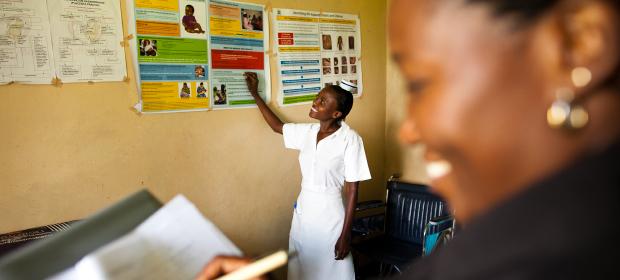Where We Work
See our interactive map


I recently had the opportunity to travel and work with our team in Uganda to help the Ministry of Health (MOH) plan for, develop, and manage its health workforce. I was reminded again of the strenuous demands placed upon nurses. Many of the nurses I met were by default “doing it all,” offering an array of facility-based and community services they weren’t fully trained to provide because there was no one else to deliver care. This is happening in both urban and rural settings, and these demands are taking a toll on nurses’ motivation.
The repercussions for nurses are many, including: compromised quality of care, on-the-job stress, and diminished job satisfaction, which further causes less than optimal performance. Nurses want to provide quality services. They have chosen to serve their communities and are dedicated to saving lives. It’s demoralizing when they are put in a position to provide care they simply aren’t prepared to give.
While Uganda has made progress in improving health outcomes, human resources challenges in the health sector continue to impede progress in meeting the 2015 Millennium Development Goals (MDGs) targets set by the Government of Uganda. Only 58% of health worker positions in the country are filled, and there is an estimated shortage of 2,000 midwives. My colleagues in Uganda have been working with the MOH and the Ministry of Education to address these shortfalls.
In the meantime, nurses in Uganda, specifically Enrolled Comprehensive Nurses (ECNs), will continue to have to take on more than their fair share of service delivery. ECNs are trained to provide a broad range of general health services and to recognize the signs of pregnancy complications to refer mothers to health centers and hospitals. But, often, they are asked to take on all safe-motherhood duties, including labor and delivery and family planning counseling—functions for which their pre-service training did not adequately prepare them. Uganda has trained more than 6,000 ECNs, but the MOH recognizes that this national program needs refocusing to ensure these nurses are trained to provide the care and services they will be expected to provide.
According to the 2011 Demographic and Health Survey, a woman gives birth to 6.2 babies on average, and the unmet need for family planning remains high at 34.3%. Less than 60% of mothers in labor receive skilled care at birth, and this percentage is even less in rural, hard-to-reach areas. Uganda’s maternal mortality ratio is 438 per 100,000 live births. Families in Uganda need more access to quality maternal health services provided by skilled health workers.
Nurses are essential to changing this situation, but they can’t do it without adequate training in family planning and obstetrics. And beyond training, they will need mentorship and ongoing performance support to ensure their new skills and knowledge lead to service delivery improvements.
When I spoke with MOH officials and other colleagues in Uganda, they discussed the government’s ambitious road map to reduce maternal and neonatal morbidity and mortality and to meet the family planning needs of its population by 2015. I was impressed and excited.
The government worked with IntraHealth’s Uganda Capacity Program, which is funded by USAID/Uganda, to develop and implement a three-pronged strategy:
1) Upgrade the skills and knowledge of existing ECNs through a six-month in-service training course in family planning and safe motherhood
2) Produce newly-certified midwives through pre-service education to fill the midwife gap, and
3) Support private-not-for-profit and faith-based health training institutions to expand their pre-service education midwifery programs.
Upgrading ECNs’ labor and delivery skills and knowledge not only promises to save the lives of more mothers and babies, but it will also offer these nurses career advancement that will benefit them as well as their families. The program will be a stepping stone to a more satisfying job, and will offer a potential career path for those who want to become certified midwives by pursuing additional schooling.
I am personally very excited about the government’s initiative to upgrade skills for frontline nurses, and I applaud Uganda’s efforts to apply both short- and longer-term solutions.
Uganda’s nurses are uniquely positioned to support families and to save more lives throughout the country. We know that nurses are the engines that drive health systems around the world, and we cannot overestimate their importance. But to close the MDG gaps in maternal and reproductive health in Uganda, and in other countries struggling with high maternal and neonatal morbidity and mortality, we don’t just need more nurses; we need to give nurses more opportunities to gain midwifery skills and commit to supporting them to provide high-quality maternal health services.
Get the latest updates from the blog and eNews




